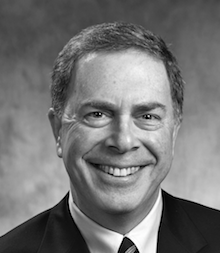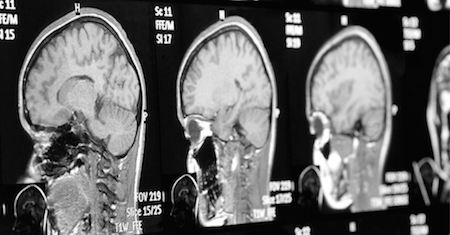May 22, 2015

Harvey S. Block, MD
Most of us only think about controlling health risks after emergencies occur. It helps to understand what may cause a stroke, and how we may reduce the chances of it occurring.
The Cause of Stroke
To prevent a stroke, it helps to know what causes a stroke.
“There are many conditions [that] may cause a stroke,” says Dean & St. Mary’s vascular neurologist Dr. Steven Block. “It can be from a blood clot traveling to the brain from a distant source like the heart.

On average, stroke kills one American every four minutes.
It can be from atherosclerosis – an inflammatory disorder of arteries that reduces blood flow to a region in the brain. It can be from a bulge in a blood vessel wall that ruptures and causes bleeding in or around the brain.”
Different causes of stroke lead to different types of stroke. Clots can be ejected from the heart because of abnormal heart rhythm called atrial fibrillation. This condition causes clots to form in the left atrium, which are ejected to the brain and other organs. Clots can also be ejected during or after a heart attack.
Sometimes, an infection in your bloodstream can settle in your heart and create clumps of infected material on the heart valves or lining of the heart. Those clumps can break off and travel to the brain causing a type of embolic stroke.
Small vessel disease can cause stroke when the tiniest capillaries close up. These types of stroke can be either minor or very devastating, leading to sensory loss, paralysis or double-vision depending on where in the brain the stroke occurs. Diabetes, high blood pressure and smoking are the biggest causes.
Certain medical conditions or lifestyle choices also contribute to stroke. Smoking, diabetes and high blood pressure can all cause capillaries in the brain to narrow and either shut down or start bleeding. Another blood vessel condition called cerebral amyloid angiopathy causes proteins to deposit within the wall of a blood vessel. Those vessels can bleed into the brain.
Then there are strokes caused by aneurysmal sub-arachnoid hemorrhages. That’s when a blood vessel wall bulges and ruptures. These strokes carry a high risk of death if not treated quickly.
Other strokes happen after trauma. A blow to the head can cause bleeding outside of the brain called subdural, epidermal or subarachnoid hematomas.
Risk Factors
There are many risk factors to consider. Some we can’t control – things like age, ethnicity and family history.
If you are a man over 45 or a woman over 55, you may be at an increased risk for stroke. A family history of stroke may also increase your risk.
However, we can treat many risk factors. These include high blood pressure, diabetes, atrial fibrillation, being overweight and having more than one alcohol-containing drink a day.
Lifestyle choices also contribute to your risk of stroke. Even if you don’t smoke, breathing cigarette smoke from other people can increase your risk, as can a diet high in sodium and cholesterol. Just 30 minutes of daily exercise such as taking a walk can reduce your stroke and heart attack risk.
Prevention
"There are treatments to reduce the damage from a stroke. These include a medication that can be injected into the vein to help dissolve a clot. There are catheter devices that can be threaded into an artery in the brain to remove a clot," says Dr. Block. “However, our best stroke treatment is to prevent it before it happens.”
Making small changes now – things like increasing daily exercise, limiting alcohol consumption and reducing saturated fats while increasing the vegetables in our diets and smoking cessation – can make a big difference in reducing the risk of stroke.
Dr. Block stresses that parents need to start early to help their children and grandchildren avoid stroke even decades down the road. While we generally think of stroke happening in older people when symptoms of atherosclerosis begin to rear their head, in some people atherosclerosis begins in youth and young adulthood. Autopsies of some young children have revealed fatty streaks in the aorta as early as 6 months, which is an early manifestation of atherosclerosis. “Our best gift to our children and our grandchildren is to set a good example about what we eat, and the importance of exercise.”
Recognizing and Responding to Stroke
The signs of a stroke can be difficult to recognize. Some signs are obvious: face drooping, arm weakness and speech difficulty. Other signs can be harder to spot.
“Sometimes patients are brought to the ER for ‘confusion’,” says Dr. Block. “In some cases this may not be confusion but from an aphasia, caused by damage to the language centers in the brain which makes it difficult to understand or speak.”
A sudden worst headache of one’s life and neck stiffness, especially during exercise or sex may be caused by sudden bleeding around the brain.
Getting rapid treatment quickly is critical to recovery. For every minute the brain goes without oxygen, you lose a billion brain cells. So don’t wait for symptoms to go away before calling 911. It’s better to err on the side of caution.
“Don’t drive them – call 911. The ambulance will get them to a hospital faster.”
Caring for the Caregiver
Stroke affects the entire family. Often it is family members who take care of loved ones once they return home from the hospital. Dr. Block says that it’s equally important for caregivers to take care of themselves.
“Caregiver burnout is a huge problem. There is a tremendous sense of responsibility,” he says. “You want to be there for them. You want to be able to help, but it wears people out.”
He offers some advice for anyone acting as a loved one’s caregiver.
“First, learn as much as you can from doctors and stroke support groups,” says Dr. Block. “Take charge of your life. You’ve got to be good to yourself. If you can’t ensure your own health, you’re not going to be very good to your loved one who is trying to recover from a stroke.”
He also advises to trust your instincts. If you notice something isn’t right with your loved one, tell the doctor. If they brush you off, press them a little bit. Ask the doctor to explain it to you.
“I don’t think any doctor would be really upset by patients or their loved ones asking for more information,” says Dr. Block.
Another point he stresses is to realize that asking for help is not admitting weakness.
“Your greatest strength is knowing that you are not alone,” he says.
If you are feeling depressed or start to experience health problems of your own – reach out, get help. Ask other family members or friends to help with caring for your loved one. Look into local agencies that offer in-home medical care. In the long term, the best way to ensure that a loved one who experienced a stroke is OK is to ensure that you are OK as well.

